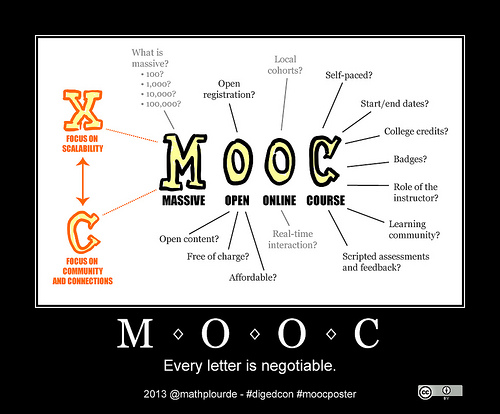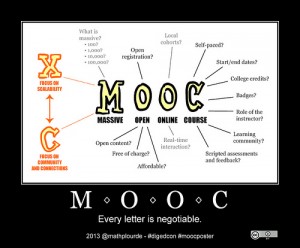
MOOCs starting to scare Universities and Professors
Gigaom had a great article this week on some of the push back that MOOCs and Coursera in particular are seeing from university professors.
A couple quotes:
Princeton professor Mitchell Duneier told The Chronicle of Higher Education Tuesday that he will no longer teach his class out of concerns that it could undermine public higher education.
In April, Amherst rejected a partnership with edX citing concerns that MOOCs could take tuition funding from middle- and lower-tier schools and lead to a degraded model of teaching.

You can read the article yourself and I also encourage the comments. What I am hearing is that things are getting scary here in this MOOC world. That both professors and universities are starting to either feel the effects or see the writing on the wall that things are going to change. The problem is….I don’t know if they can really control it or stop it.
When anyone anywhere can learn anything and all they need is an internet connection and a device to access it….things change.







Waiting to see the work of the first MOOC trained nurses, surgeons, engineers, etc. Hoping they back up that final sentence…specifically, for the better.
the commodification of education is furthered by the free distribution of content. This should have professors scared. For years they have been focused on research and producing content for academic debate and discussion. The teaching component has been largely ignored. The question now is how do educators and educational institutions create value for all of the their diverse constituents and for society?
Great read! Although I do feel that there needs be a balance between personal interaction and online interaction, the issue with MOOCs seems to more financial than anything else. In some cases it is necessary to actually be there for the actual hand-ons experience, but for some cases, especially introductory or general courses MOOCs could potentially be a better way to go.
Hi, My name is Morgan Rushlow, and I am a student in EDM 310 at the University of South Alabama. I thought this is a very interesting thought that you have here, Jeff. I agree that education will change in the future. Could the reason be that this is scary to some is that there is uncertainty about how it will change things in education? Or could there be many reasons that this is scaring some? What changes will be coming down the road after these changes take place? Indeed many questions to ask from this thought- Very interesting.
here is a link to my EDM 310 student blog-
http://rushlowmorganedm310.blogspot.com
and my twitter page-
https://twitter.com/morganrrushlow
In many ways, the free and open availability of research and instruction will make knowledge available to a broader audience than just university professors and researchers. The issue might be what happens to the research that is funded? does that become public domain as well?